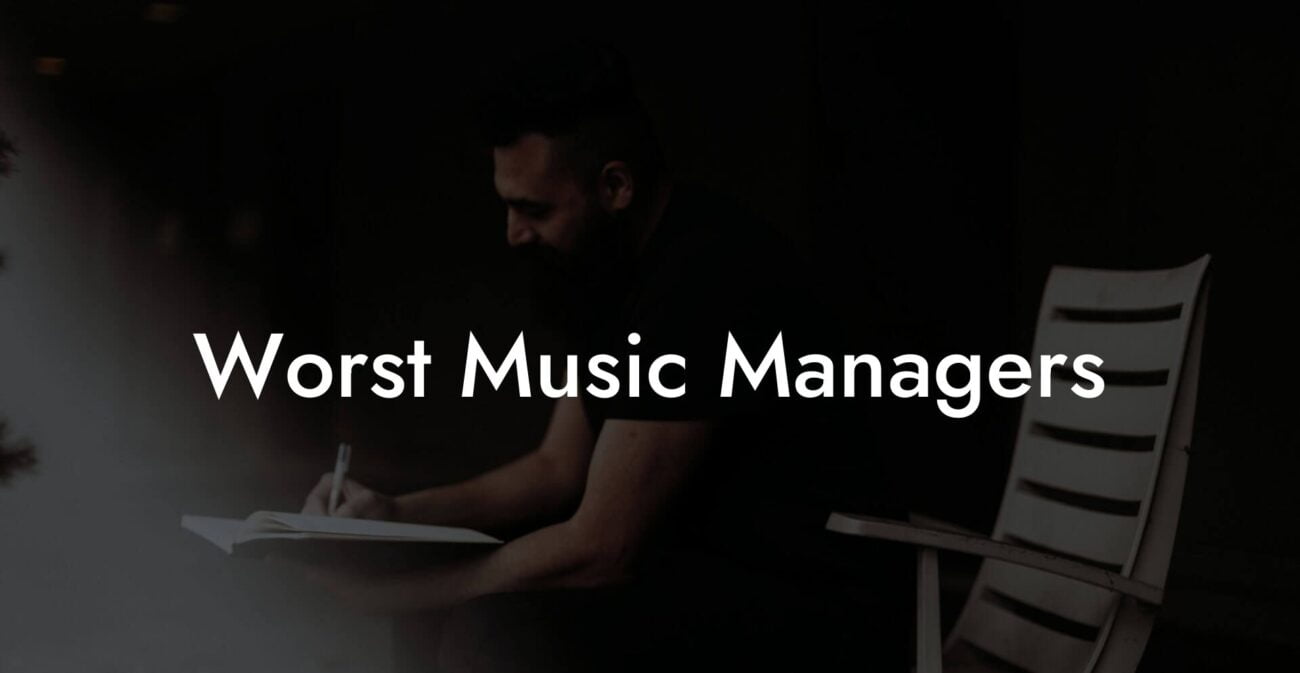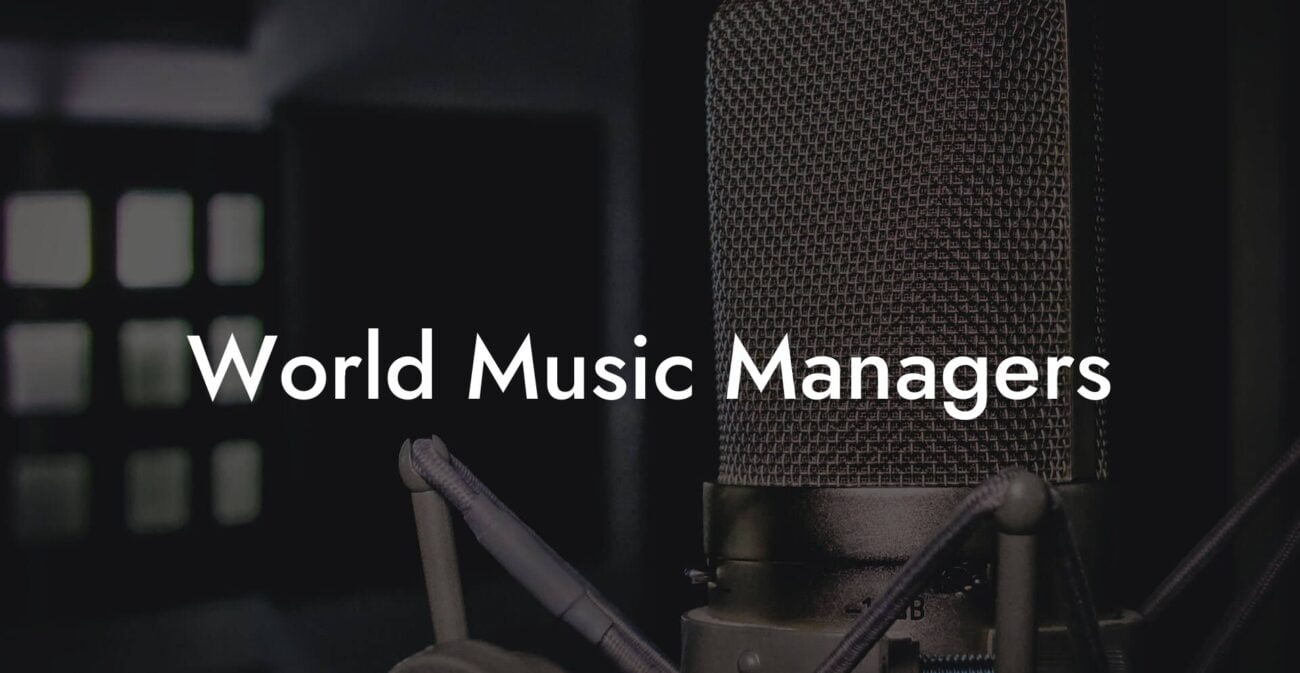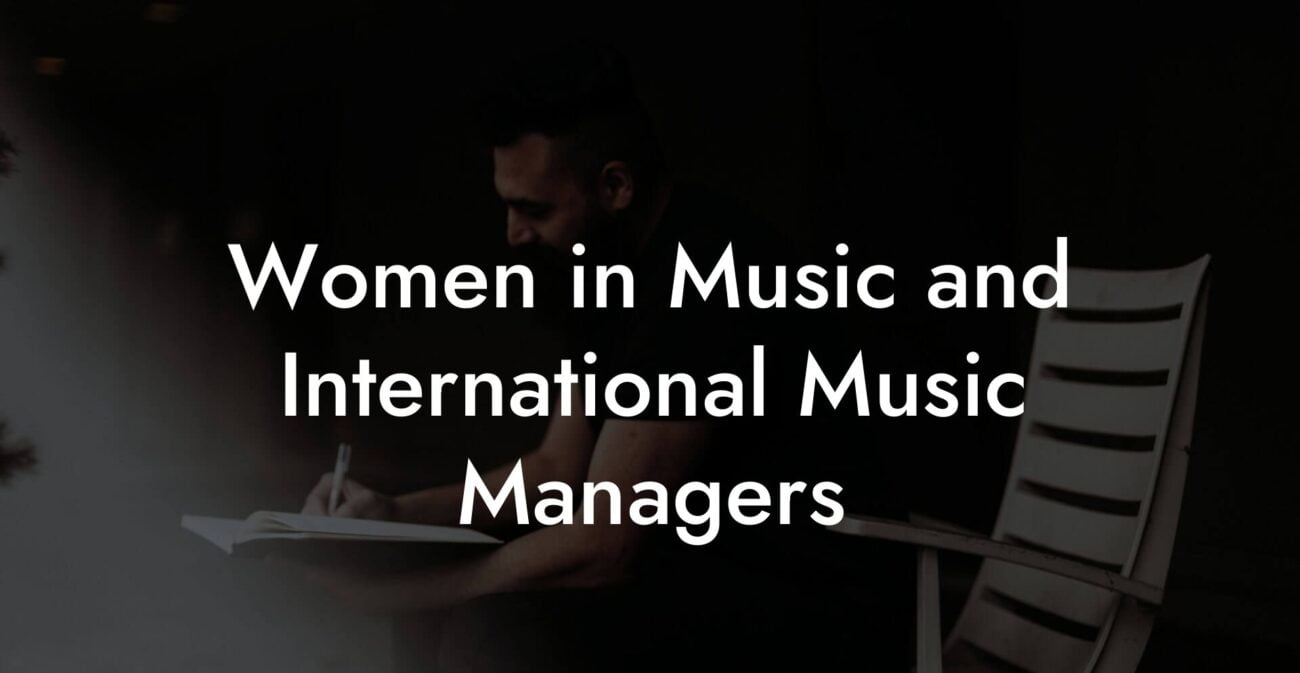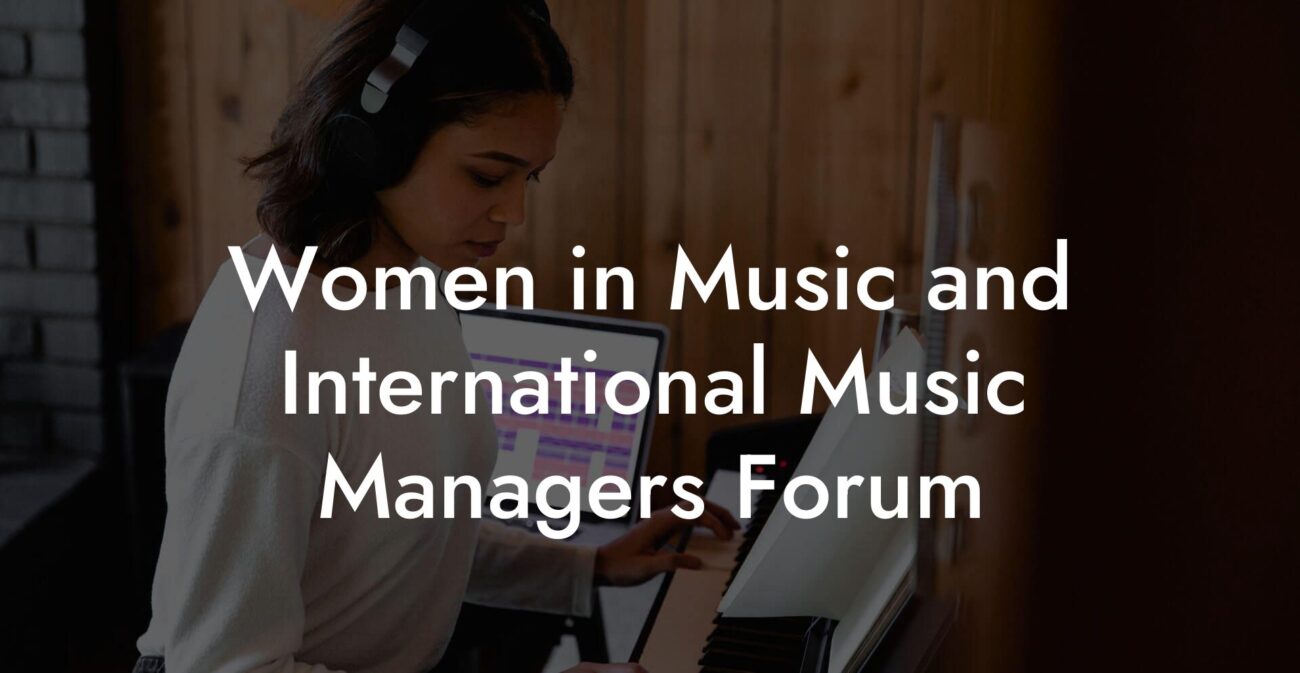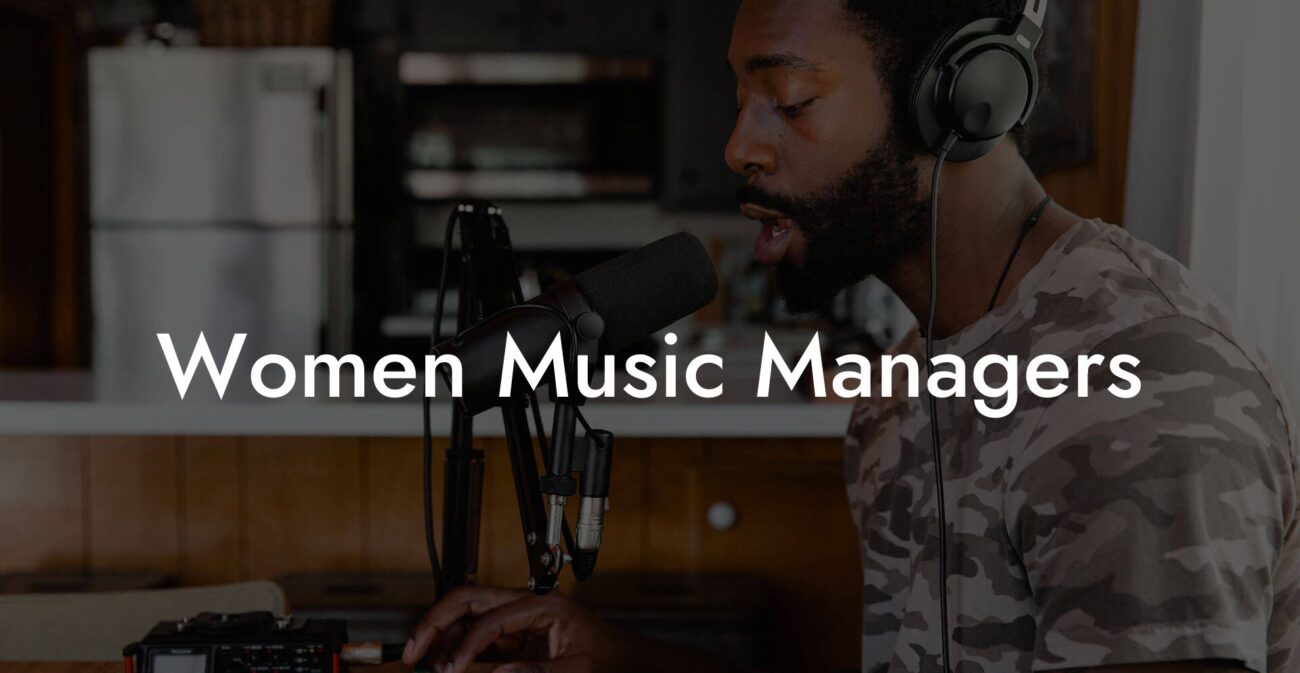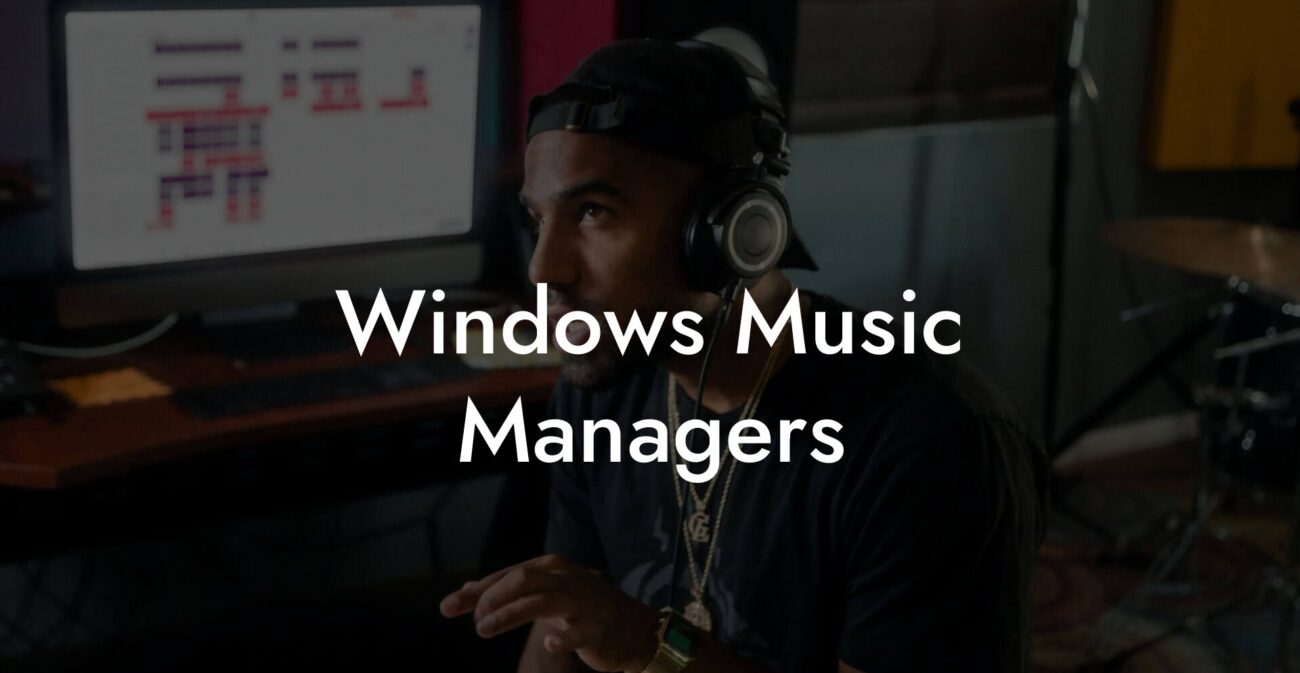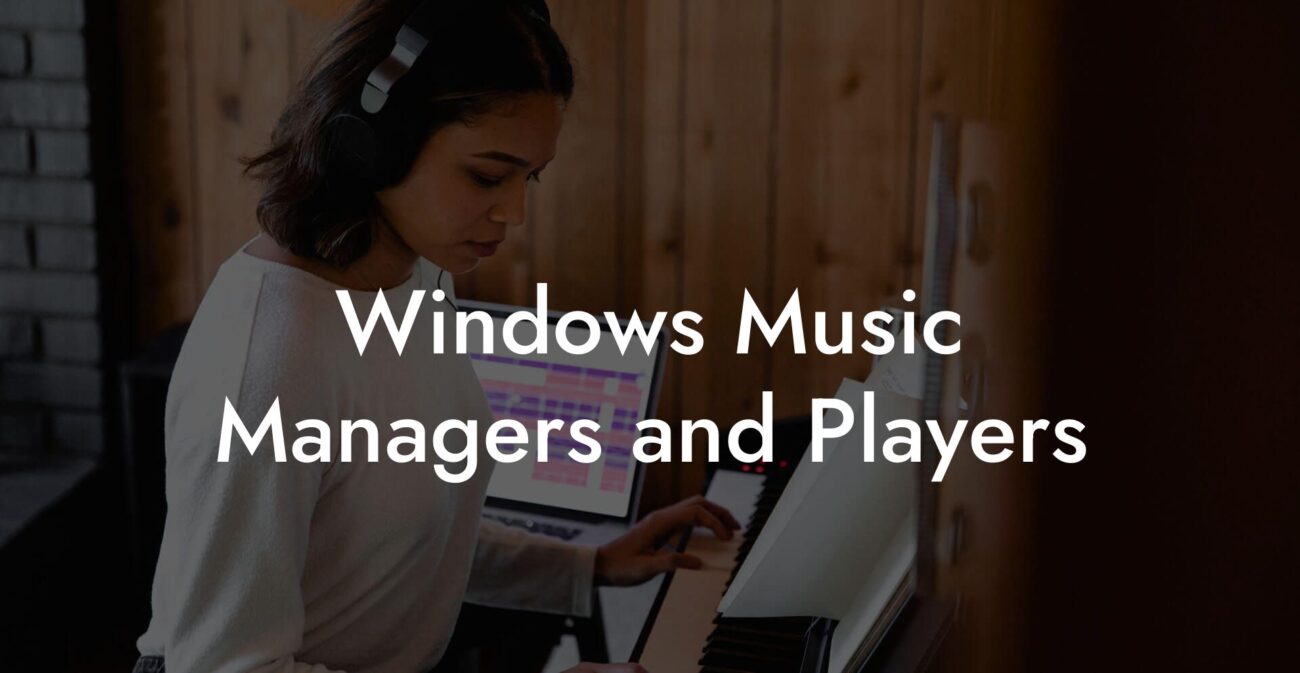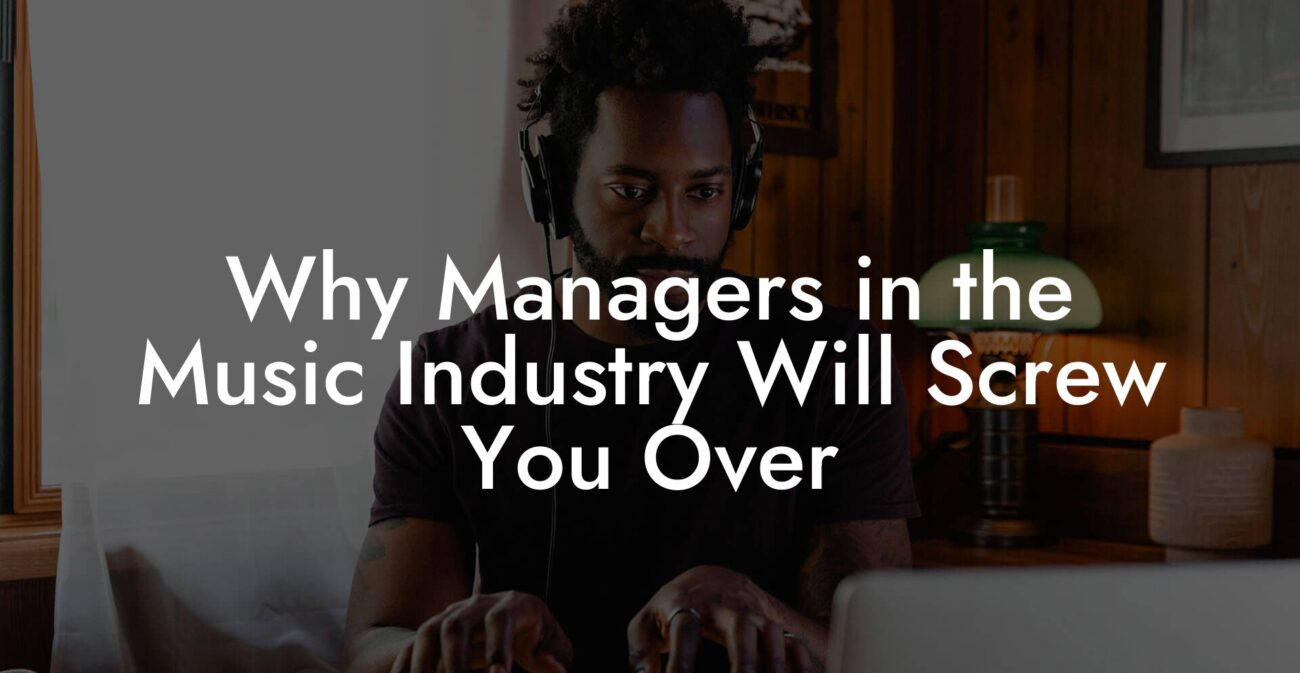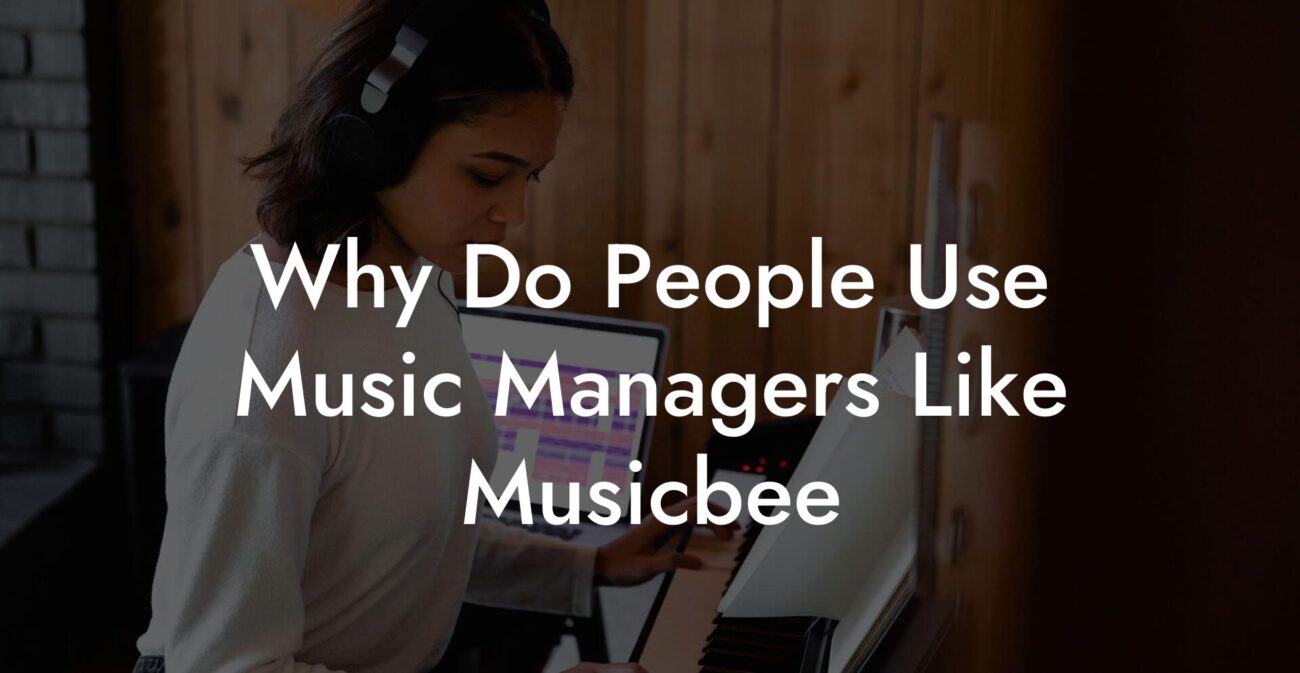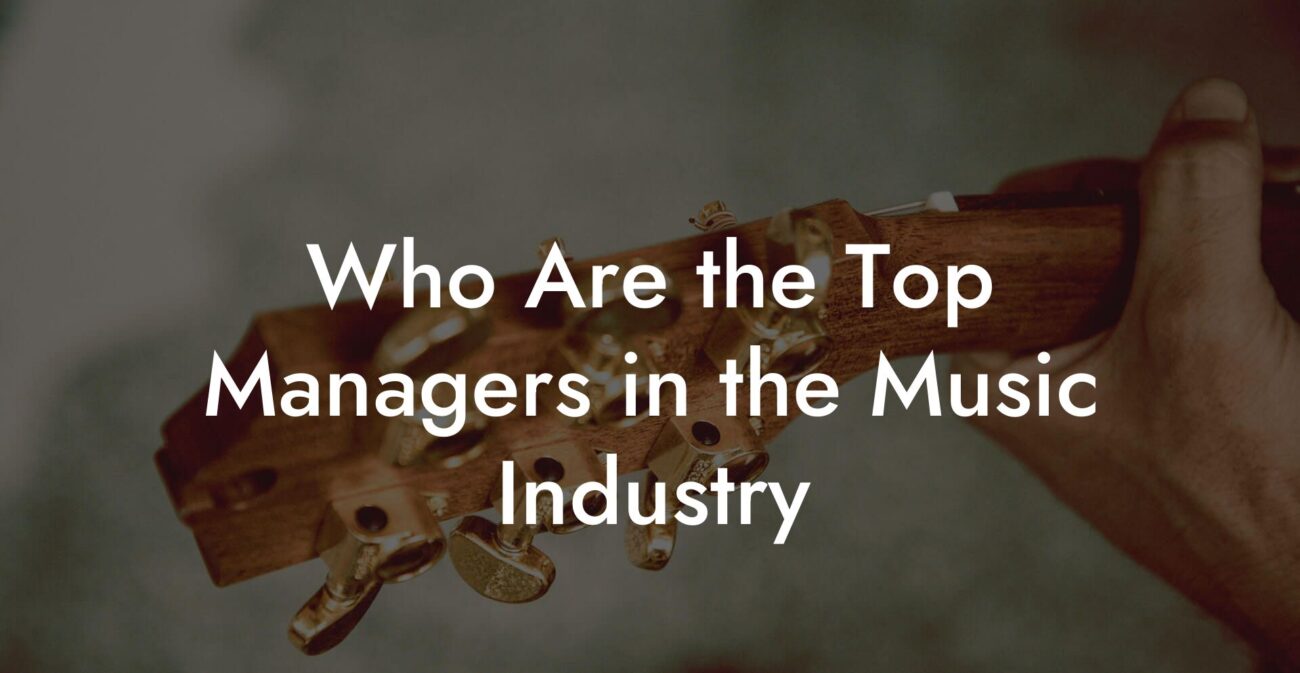Songwriting Advice
What Percentage Do Talent Music Managers Take
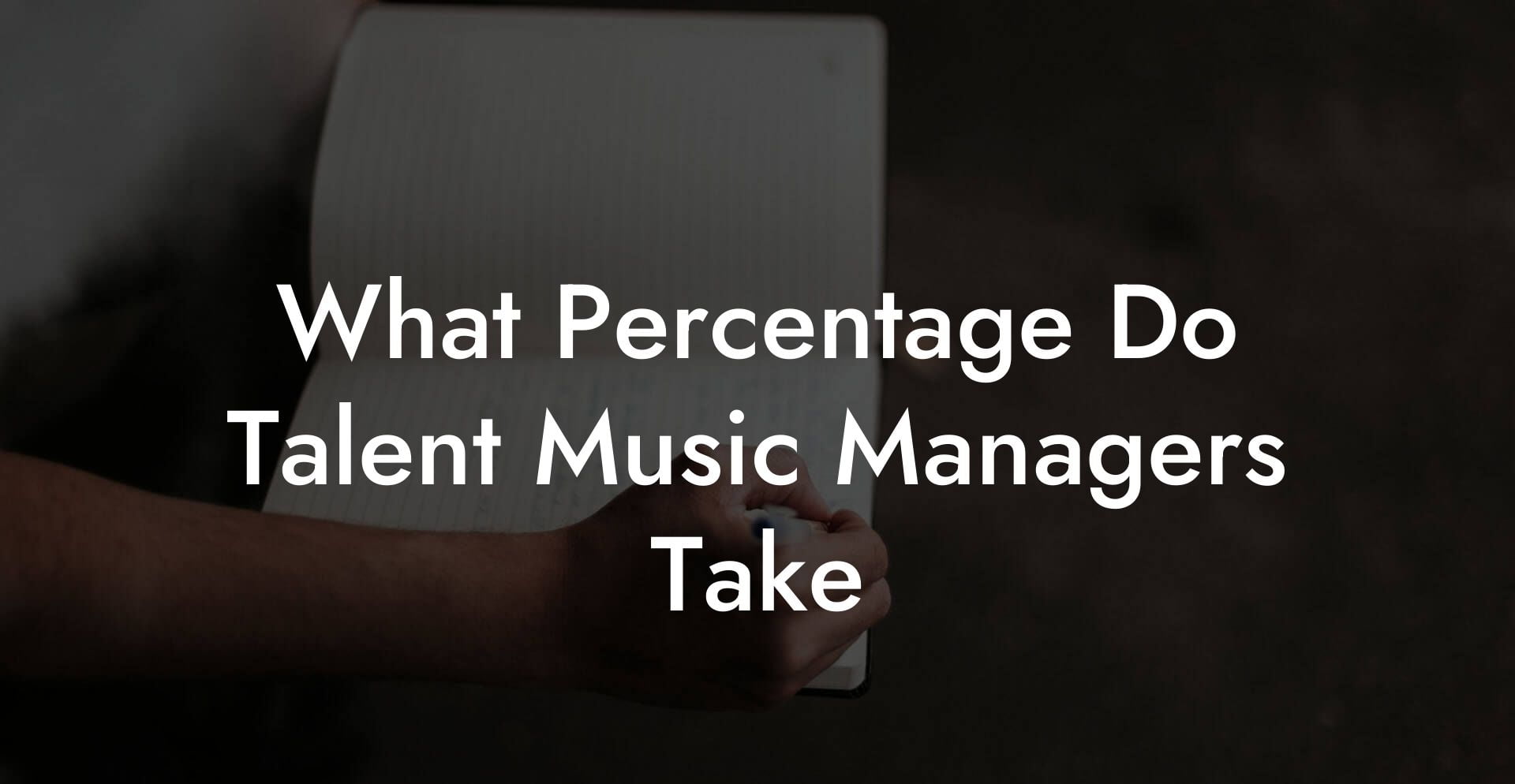
Have you ever wondered if your talent manager is secretly riding a unicorn made entirely of commission checks? Welcome to the wild, wacky world of music management percentages, where the numbers are as unpredictable as a last-minute lyric drop and as nuanced as your favorite indie track. Whether you’re an aspiring songwriter, signing your first management deal, or just daydreaming about making it big with your next banger, this guide is here to break down exactly what percentage talent music managers take, why it matters, and how you can negotiate like the rockstar you were always meant to be.
Quick Interruption: Ever wondered how huge artists end up fighting for their own songs? The answer is in the fine print. Learn the lines that protect you. Own your masters. Keep royalties. Keep playing shows without moving back in with Mom. Find out more →
Quick Interruption: Ever wondered how huge artists end up fighting for their own songs? The answer is in the fine print. Learn the lines that protect you. Own your masters. Keep royalties. Keep playing shows without moving back in with Mom. Find out more →
Quick Links to Useful Sections
- The Role of a Talent Music Manager: More Than Just a Cheerleader
- Understanding the Commission: What Percentage Do Talent Music Managers Take?
- Breaking Down the Numbers: Gross vs. Net Income and Manager Percentages
- Flexibility in Managerial Agreements: Commission Structures and Alternative Models
- Industry Standards and Trends: What Are Other Artists Paying?
- Negotiating Your Manager Contract: Tips for Aspiring Musicians
- The Digital Age and Independent Management: Changing the Game
- Real-World Scenarios: When Manager Percentages Make or Break a Career
- Tips for Aspiring Musicians: Maximizing Your Earnings and Creative Freedom
- Resources and Community Support: Your Next Steps
- Charting Your Path: Building a Successful Music Management Relationship
- Case Studies: From Zero to Headliner, Manager Deals That Made a Difference
- The Breakout Band:
- The Independent Solo Artist:
- Future Trends: What’s Next in Music Management Percentages?
- Integrative Music Management FAQs: Your Questions Answered
- Your Next Steps: Embrace Your Musical Future with Confidence
The Role of a Talent Music Manager: More Than Just a Cheerleader
Let’s start by answering the burning question: What exactly does a talent music manager do? Contrary to popular belief, your manager isn’t just the person who makes sure you look cool on Instagram or knows the best brunch spots. A top-notch music manager is essentially your personal A&R, business advisor, booking agent, and sometimes even your therapist, all rolled into one. They get your music heard, connect you with industry insiders, help you navigate the maze of record deals, and negotiate contracts while trying to preserve your creative vision.
In their bustling day-to-day, managers wear many hats: scouting gigs, arranging rehearsals, fine-tuning your image, and, importantly, ensuring that you, and the manager, are both on the same page when it comes to revenue splits. This leads us directly into our first major discussion point: the percentage a talent manager takes from your hard-earned cash.
Remember, having a good manager isn’t about sacrificing your share of earnings. It’s about leveraging their expertise, connections, and hustle to multiply your opportunities in an industry that’s as competitive as it is creative. And yes, they do deserve a cut, but how much is too much?
Understanding the Commission: What Percentage Do Talent Music Managers Take?
Picture this: You’ve just released your debut single, your song is slowly making its way onto your favorite playlists, and money is beginning to trickle in. Now, enter the manager commission, the percentage of your earnings they take for orchestrating all that chaos. Traditionally, talent managers typically claim anywhere between 10% to 20% of your gross income. This percentage isn’t set in stone, though, it can fluctuate depending on several factors.
Here are some key factors that impact that percentage:
- Experience and Reputation: A seasoned manager with a killer track record might command a higher percentage because they have proven connections and the know-how to make your career skyrocket.
- Scope of Services: If your manager is heavily involved in every aspect of your career, from bookings to branding and beyond, then a higher percentage might be justified.
- Negotiation and Contract Terms: Some managers might start with a lower commission rate initially and renegotiate as your career grows. On the flip side, new managers looking to break into the business might offer competitive rates (or even deferred payments) to win your trust.
- Revenue Streams: The commission percentage might differ depending on which revenue streams are under the manager’s purview, like performance fees versus digital royalties or merchandise sales.
In general, if your manager is taking more than 20% of your income, it’s a good idea to ask some hard-hitting questions about what added value they bring to the table. After all, every percentage point matters when you’re striving to pay your rent, fund your next music video, or drop that highly anticipated debut EP.
Breaking Down the Numbers: Gross vs. Net Income and Manager Percentages
It’s time to get a bit technical, promise, it’s worth it. When discussing what percentage your manager takes, you might come across terms like “gross income” and “net income.” Understanding the difference is key:
- Gross Income: This is the total revenue you make before any expenses are deducted. Some managers prefer a percentage of your gross income because it means their take is a fixed share of all your earnings, regardless of costs.
- Net Income: This is the money left over after you subtract expenses like production costs, tour expenses, marketing, and other overheads. Negotiating a net basis commission might sound more appealing, but it often comes with a lot more accounting intricacies, and sometimes, higher percentages to cover the manager’s risk in a more uncertain financial terrain.
In many cases, the industry standard remains a 15% commission on gross income, a middle ground that compensates the manager correctly while leaving you with enough incentive to keep pushing your creative boundaries. However, if you’re just starting out or if your music career is still in its infancy, you might negotiate lower percentages or flexible arrangements that become more lucrative as your career blossoms.
Pro tip: Always have a financial advisor or an entertainment lawyer help you decode those contract clauses. What looks like a simple 15% clause might have hidden complexities that could cost you big in the long run.
Flexibility in Managerial Agreements: Commission Structures and Alternative Models
Music management in the modern era isn’t a one-size-fits-all business model. The digital revolution, the rise of independent artists, and transformative distribution strategies mean that manager commissions can be flexible, creative, and, dare we say, artist-friendly.
Here are some alternative models to watch out for:
- Sliding Scale Commissions: This model is designed to adjust the manager’s percentage as your career grows. For instance, a manager might start at 10% during the early stages and incrementally increase their cut as you reach predetermined revenue milestones.
- Deferred Payments: Especially common with emerging artists, some managers may work on a deferred basis until you hit a money-making milestone. It’s a gamble they’re willing to take because they believe in your potential, and it might mean lower upfront costs for you.
- Flat Fee Agreements: Although rare in a field that typically relies on percentage-based commissions, some managers might opt for a flat fee for specific services, particularly if it’s a one-off project or campaign. This can be ideal if you’re certain of what you’re getting in return with clear deliverables.
- Commission Plus Bonuses: In some contracts, managers charge a base commission with the possibility of earning bonuses if certain performance targets are met. This structure aligns both parties toward a common goal, growing your earnings.
Flexibility is a double-edged sword; while these models offer adaptability, they also require both you and your manager to be on the same page about expectations, goals, and the eventual division of revenue. Transparent communication is key to avoiding any future contract hang-ups.
Industry Standards and Trends: What Are Other Artists Paying?
If you’re in the early stages of your career, it’s totally normal to feel a bit overwhelmed by the idea of someone taking a percentage of your earnings. To ease those worries, let’s look at what industry standards say. Historically, many established artists with a strong following might have managers taking anywhere from 15% to 20% of their gross revenue. But here’s where it gets interesting for Gen Z and millennial artists: in today’s hyper-connected digital world, independent artists are negotiating deals that are more nuanced and often more favorable.
For example, if you’re leveraging online streaming platforms, social media sponsorships, and crowdfunding campaigns, you might find managers who understand the importance of digital income streams and are willing to accept lower percentages in exchange for a share of future revenue as your brand grows. Meanwhile, high-caliber managers with an enviable track record might stick to the established percentages because their network and expertise are worth every penny.
One key takeaway? Don’t be shy about shopping around and consulting with multiple managers. Just like you wouldn’t accept the first lyric generator you find, do your homework on potential managers. Evaluate their track record, ask for references, and make sure they’re transparent about their fee structure. Your career, and your wallet, deserve nothing less.
Negotiating Your Manager Contract: Tips for Aspiring Musicians
Now that we’ve broken down the percentages, let’s talk negotiation, because let’s face it, nobody likes feeling like they’ve been taken for a ride. Negotiating your contract with a talent manager can seem as challenging as writing the perfect chorus. Here are some practical tips to keep in mind:
- Do Your Homework: Before signing anything, get to know the industry standards, and understand what services the manager offers. Use resources like Lyric Assistant to also hone your craft so you’re not just relying on management to get you noticed.
- Consult a Professional: Whether it’s an entertainment lawyer or a seasoned industry veteran, having someone in your corner to review the contract can help you spot potential red flags.
- Clarify the Scope of Services: Be crystal clear about what your manager is expected to deliver. Will they handle digital marketing, live bookings, licensing deals, or all of the above? The more detailed the contract, the less room there is for unexpected surprises down the road.
- Negotiate Milestones: If your manager wants a percentage that seems steep at first, propose a sliding scale model that adjusts as your career reaches specific milestones, such as revenue targets or record deals.
- Discuss Term Length and Exit Clauses: Make sure you’re comfortable with the length of the contract and that there are clear exit strategies if things don’t go as promised.
- Keep the Conversation Open: Remember, a good manager isn’t just a business partner, they’re a collaborator. Regular check-ins on your progress and periodic reviews of your contract can help ensure that both parties remain happy as your career scales new heights.
Armed with these strategies, you’ll be better equipped to secure a deal where both you and your manager win, ensuring that the percentages add up to success rather than leaving you feeling shortchanged.
The Digital Age and Independent Management: Changing the Game
There’s no denying that the digital revolution has flipped the music industry on its head. Today, with streaming platforms, social media, and crowdfunding sites, emerging artists have never had more control over their careers. And with that control comes a shift in how managers negotiate their fees.
In this brave new world, some artists choose to self-manage with the help of digital tools (like our very own Lyric Assistant) to focus on their creative output. Meanwhile, even managers are embracing digital strategies to maximize exposure and revenue streams, with contests, online collaborations, and influencer partnerships all forming new revenue models that sometimes call for innovative commission structures.
If you decide to go the independent route, you may be surprised to find that the traditional percentages no longer apply uniformly. Instead, you could end up with hybrid arrangements where your manager’s influence is more limited but strategically focused, like managing your online brand, securing digital sponsorships, or forging partnerships with well-known platforms.
This dynamic environment means that negotiations today are often more fluid than ever before. You might even negotiate a contract that rewards your manager based on metrics like social media engagement or streaming growth. The digital age allows for an exciting array of performance-based models that put more power into your hands as an artist.
Real-World Scenarios: When Manager Percentages Make or Break a Career
Let’s spice things up with some real-world scenarios that illustrate how manager commission percentages can influence a musician’s journey. Consider the case of an up-and-coming indie artist who signs with a manager charging a modest 10% commission on a deferred basis.
Initially, the deal appears attractive, low upfront costs and a promise to ramp up as career milestones are met. Over time, thanks to the manager’s savvy connections and relentless hustle, the artist secures high-profile gigs, garners media attention, and sees their streaming numbers skyrocket. The 10% cut, though modest, now translates into tangible value that directly correlates with the manager’s hard work and the success of the project.
Contrast this with another scenario where an artist unwittingly signs a contract with a manager demanding 25% on gross revenue, packing in numerous unseen fees. While the manager might boast a flashy resume and confident pitch, the steep percentage starts to cut into the artist’s earnings, leaving less to reinvest in producing new music, marketing, or touring. What might have seemed like a dream team partnership at first turns into a financial quagmire, a cautionary tale of why transparency in contract terms is non-negotiable.
These scenarios underscore the importance of not only understanding what percentage talent managers take but also ensuring that the structure aligns with your long-term career goals. After all, every percentage point makes a difference when you’re on the path to turning your passion into a sustainable career.
Tips for Aspiring Musicians: Maximizing Your Earnings and Creative Freedom
Beyond the percentages, let’s talk strategy. As you navigate the intersection of artistry and business, consider these tips to maximize your earnings and maintain creative freedom:
- Invest in Your Brand: Build a strong identity and online presence that resonates with your audience. Use platforms like Lyric Assistant not only to perfect your lyrics but also to connect with fans in fresh, innovative ways.
- Diversify Your Revenue: Don’t put all your eggs in one basket. Explore multiple income streams, from digital royalties and live performances to merchandise and sponsorships, to create a balanced financial portfolio.
- Educate Yourself: Arm yourself with knowledge about industry trends, contract law, and music business practices. The more informed you are, the better equipped you will be to negotiate deals that work in your favor.
- Network, Network, Network: Relationships matter. Attend industry events, engage with peers online, and cultivate connections with mentors who can offer insights and guidance as your career evolves.
- Embrace Flexibility: The music industry is always evolving. Be open to unconventional deals, digital collaborations, and performance-based contracts that may offer more value in the long run.
By putting these strategies into practice, you’ll not only negotiate better deals but also set the stage for a fulfilling, financially rewarding career that lets your creativity soar free.
Resources and Community Support: Your Next Steps
Ready to take the leap? Whether you’re drafting your next management pitch or just thirsty for more insider tips, there’s a wealth of resources waiting for you. Check out online courses, industry blogs, and forums where fellow musicians share their contract negotiation stories. Social media groups and platforms like Reddit’s r/WeAreTheMusicMakers offer daily doses of inspiration and practical advice.
And remember, you’re not alone on this journey. Professional organizations, music industry associations, and even local networking events can connect you with mentors who’ve been there before. Use these resources to broaden your understanding, share your experiences, and help shape a future where artists and managers work as partners in creativity and profit.
At Lyric Assistant, we’re passionate about empowering musicians to take control of their art and their financial destiny. Dive into our blog for songwriting tips, contract negotiation insights, and stories from fellow artists who learned the ins and outs of the business. After all, every lyric you write is a step closer to turning your passion into a profitable career.
So, what are you waiting for? Engage with the community, learn from the experts, and let your journey to a successful, independent music career begin today!
Charting Your Path: Building a Successful Music Management Relationship
A healthy relationship with your talent manager can be as smooth as a well-produced track. To ensure that both your creative output and financial growth hit all the right notes, keep the lines of communication open and be proactive about setting shared goals. Consider scheduling regular strategy sessions or performance reviews to discuss what's working and what needs tweaking.
Collaboration is the name of the game in the modern music industry. When you and your manager share your vision, embrace feedback, and align your expectations from the get-go, you create a synergistic relationship where both parties feel valued. This mutual understanding not only helps streamline negotiations over commission percentages but also fosters a creative environment where innovation thrives.
Remember, at the heart of every successful music career is a partnership built on trust, ambition, and a shared love for the art. So, whether you’re jamming out in a local dive or dropping tracks that captivate thousands online, your manager is there to help guide you through the labyrinth of contracts, gigs, and revenue shares.
Case Studies: From Zero to Headliner, Manager Deals That Made a Difference
Let’s break down a couple of case studies that demonstrate how a well-negotiated manager deal can transform an artist’s career.
The Breakout Band:
An up-and-coming band, fresh out of local gigs and hungry for recognition, managed to secure a manager fixated on a sliding scale commission model. Starting at a modest 10% during their early days, the manager’s deep industry connections and relentless hustle eventually landed the band a residency at a high-profile venue. With each milestone, the percentage nudged up slightly, but so did their earnings and exposure. Today, that band is headlining major festivals, proving that the right manager and the right deal can be a total game-changer.
The Independent Solo Artist:
Next, consider an independent solo artist who dabbled in the DIY route for years before realizing the benefits of professional management. Her contract featured a flexible commission model with a deferred payment option that only kicked in after her streaming numbers hit a critical mass. Her manager, who had an eye for digital trends and influencer collaborations, leveraged social media algorithms to drive unprecedented engagement. As a result, the artist broke into international markets while still enjoying creative freedom, a clear win-win scenario that set her up for sustained success.
These case studies remind us that every deal is unique, just like every artist’s sound. It’s not about finding a one-size-fits-all percentage; it’s about sculpting an arrangement that elevates your career, supports your artistic vision, and ultimately ensures that both you and your manager share in the success.
Future Trends: What’s Next in Music Management Percentages?
As we surf the wave of digital evolution, the way managers earn their cut is poised to change dramatically. Artificial intelligence, blockchain, and data-driven marketing platforms are beginning to influence how revenue is generated and, subsequently, how it’s split. Imagine a future where smart contracts automatically adjust manager commissions based on real-time metrics, ensuring absolute transparency and fairness!
Additionally, as streaming platforms refine their payout models, you might see more innovative revenue splits based on performance metrics like listener engagement, playlist placements, and social media virality. For the digitally savvy musician, this means negotiating deals that are not only lucrative but also flexible enough to adapt to the rapidly shifting landscape of the music industry.
While these trends are still emerging, they promise a more democratized and transparent environment where success is measured by creativity and engagement rather than outdated industry norms. Stay informed, stay connected, and be ready to negotiate deals that truly reflect the modern era of music.
Integrative Music Management FAQs: Your Questions Answered
We know you’ve got questions about how talent manager percentages work, so here’s an FAQ that dives into the nitty-gritty details:
1. What percentage do talent music managers typically take?
Most talent managers take anywhere from 10% to 20% of your gross earnings. This figure can vary based on the manager’s experience, the scope of services provided, and the specific revenue streams involved.
2. Why do some managers charge a higher percentage?
Managers with a strong track record, extensive industry contacts, or who offer comprehensive services (bookings, marketing, branding, etc.) might charge closer to 20%. Their higher percentage reflects the added value and opportunities they bring to your career.
3. Can I negotiate a lower commission rate as an emerging artist?
Absolutely! Many emerging artists negotiate deferred payments, sliding scale commissions, or lower initial percentages which increase as your revenue grows.
4. What’s the difference between gross and net income in manager deals?
Gross income is your total revenue before expenses, while net income is what remains after subtracting costs like production and marketing. Managers may take a percentage from either, but gross-income deals are more common for clarity.
5. How do digital income streams affect manager commissions?
With diverse revenue streams from streaming, social media, and merchandise, some managers structure deals to account for each different income type, sometimes even offering performance-based models.
6. Is it common for manager commissions to change over time?
Yes, many contracts include clauses for sliding scale percentages that adjust once you reach specific revenue or career milestones.
7. What should I look for in a management contract?
Look for clear details on commission rates, scope of services, term lengths, exit clauses, and any additional fees. Transparency is key.
8. Can I switch managers if I’m not satisfied with the deal?
Most contracts include exit clauses, but always review the terms carefully with an entertainment lawyer to ensure you have a smooth transition plan if needed.
9. How does a manager add value besides collecting a commission?
A great manager will open doors to new opportunities, negotiate better deals, leverage digital growth strategies, and act as a vital partner in your career development.
10. Where can I get help understanding my contract?
Consider consulting with an entertainment lawyer or experienced music industry professional to help decode contract language and ensure your interests are protected.
Your Next Steps: Embrace Your Musical Future with Confidence
Navigating the labyrinth of talent management percentages might seem daunting, but remember: every legendary musician started somewhere. Whether you’re negotiating your first deal or revisiting an existing contract, understanding what percentage talent music managers take is crucial for protecting your creative and financial future.
Take the time to educate yourself, network with industry insiders, and use all the resources available, from trusted mentors to digital tools like Lyric Assistant, to hone your craft and entrepreneurship. The music industry is evolving, and so are the strategies to secure fair, mutually beneficial agreements.
Embrace the journey with humor, boldness, and a dash of skepticism where needed. Every percentage point matters, and your savvy negotiation skills could be the difference between an average career and that headlining tour you’ve always dreamed about. So, arm yourself with knowledge, stay true to your creative vision, and let your music, and your business acumen, shine.
Your journey in the music industry is uniquely yours, and each step you take shapes the legacy you’re creating. Whether you’re grinding out gig after gig or preparing to drop the next viral hit, knowing the ins and outs of manager percentages will help you make informed decisions that empower you both creatively and financially. Now, go forth and change the world with your music!


